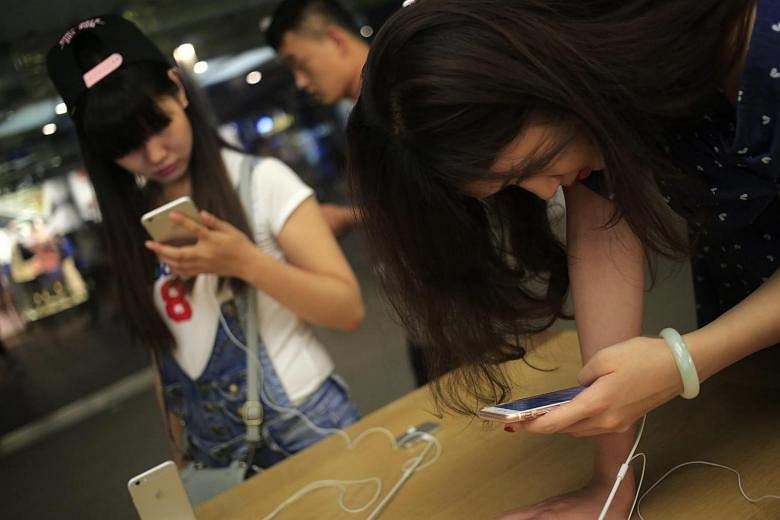HONG KONG (BLOOMBERG) - Talkative people pay back loans. The very talkative default. Too taciturn is no good either. Also, don't take out a loan at 4am.
Those are lessons from online lenders in China that are tracking people's behavior - via apps on their mobile phones - and taking it into account when deciding what their credit ratings should be.
Chinese consumers don't mind handing over personal details that would spark outrage in the West, in exchange for lower interest rates. The Chinese willingness to share is key to China's plan to create the largest repository of online data on its citizens and their habits in the world.
More than 80 per cent of what's collected is in the hands of the government, which will make it largely available for private sector use, Chinese Premier Li Keqiang recently told an audience in China that included Dell chief executive officer Michael Dell.
WeLab, a Hong Kong-based online lender that makes loans in China, looks at what apps people have downloaded, where they go using the phone's GPS tracker, their social networks and their school records. It offers discounted interest rates for each extra piece of personal information that helps profile customers for credit ratings.
In Hong Kong, for example, giving WeLab access to a Facebook account gets a 5 per cent discount on the cost of a loan, and access to LinkedIn gets you 10 per cent off, on loans with interest rates that otherwise reach as high as 20 per cent.
"Chinese people have no issue handing over their personal data, giving you their credit card number, giving you their bank account," said GGV Capital's Shanghai-based managing partner Jenny Lee, whose Silicon Valley venture capital firm has invested in data-hungry tech giants such as Alibaba Group Holding Ltd.
"Look at the whole internet finance sector, people are giving you their bank statement so you can do profiling."
WeLab's technology has drawn investor interest including from Asia's third-richest man Li Ka Shing, ING Groep, Sequoia Capital, Malaysia's Khazanah Nasional and Chinese state fund Guangdong Technology Financial Group. In January, the company raised US$160 million (S$214.8 million).
Other Chinese data miners have drawn global investors, too. Shanghai-based China Rapid Finance uses data collected from internet companies including Tencent Holdings to pre-approve millions of potential borrowers based on the frequency of their instant messaging, the number of online friends, how long they've had their phones and their mobile shopping and gaming habits.
Private equity firm Broadline Capital of New York has led a funding round. China Rapid Finance is planning an initial public offering, the Wall Street Journal reported earlier.
Probing the digital trail certainly isn't confined to China. Data mining has become commonplace among US retailers. Big-data analytics, already a US$16 billion industry in the US, is forecast to be the fastest-growing software segment by revenue, reaching US$23 billion by 2019, according to International Data Group's IDC.
Lenders in the US faced regulatory hurdles in factoring in social media to determine creditworthiness, and Facebook Imade it tougher for outsiders to monitor posts, the Wall Street Journal reported.
It's the developing world where the business is biggest, including in Latin America and Africa. Kreditech, based in Hamburg, Germany, is among the largest of the new breed of consumer lending data collectors in emerging markets, with more than 306 million euros (S$465.7 million) in backing from the likes of Peter Thiel, New York-based private equity firm J.C. Flowers & Co., and venture capital firm Amadeus Capital Partners.
First Access, a New York-based startup, mines data stored on Tanzanian and Kenyan borrowers' mobile phones to recommend a loan amount to banks and microfinance lenders within 90 seconds.
Others include EFL Global, originally developed at Harvard University's Center for International Development, and Singapore-based Lenddo.
Yet the breadth and depth of the data being collected in China is far greater because of fewer cultural and legal barriers to sharing personal information. China has set a goal of becoming the global leader in mining digital data, with a data pool bigger and deeper than any in the world.
Its key advantages include the world's largest population of 1.3 billion people combined with a culture more accustomed to surveillance and handing over personal data. Since the Mao era, China's government has kept a secret file, called a dang'an, on almost everyone.
A dang'an contains school reports, health records, work permits, personality assessments, and other information that might be considered confidential and private in other countries. It can determine whether a citizen is eligible for promotion or a coveted urban residency permit.
"There's a whole consumer ability to accept uncertainty, lack of privacy, being listened to," said GGV Capital's Lee, citing the collective ideology of Communism as a possible reason.
China's government intends to allow its homegrown tech companies to use the data, with unspecific pledges to protect privacy.
"Except for those concerning national security, commercial secrets and privacy, other resources and data shall be made accessible to the public," Premier Li said as part of his comments that 80 per cent of China's data is in the hands of the government, made last month at the Big Data Expo in Guiyang, an undeveloped province that China wants to refashion into a global big-data hub.
More than 20 per cent of global data processing and storage will take place inside China's so-called Great Firewall by 2020, said Lin Nianxi, deputy chairman of the National Development and Reform Commission.
"China will then become the world's biggest data resource country and a global data center," he said.

